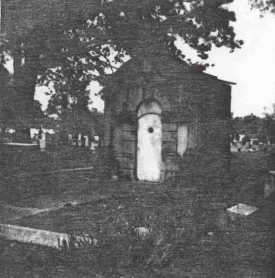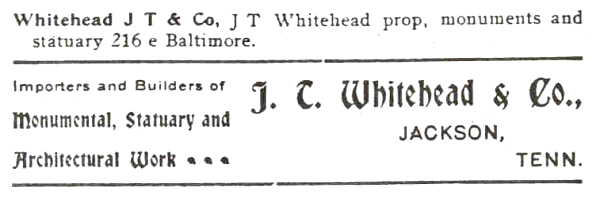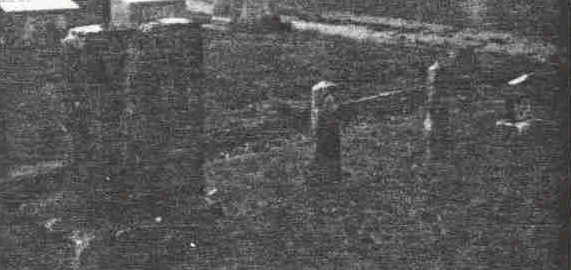MY RIVERSIDE CEMETERY TOMBSTONE INSCRIPTIONS
SCRAPBOOK PART VI
by Jonathan K. T. Smith
Copyright, Jonathan K. T. Smith, 1995
NOTES BY LOT
LOT 130, TOMLINSON
south to north:
- J. A. TOMLINSON
1819-1882 - FRANCIS, wife of J. A.
TOMLINSON
1817-1888 - IKE S. TOMLINSON
Oct. 6, 1860-Mar. 22, 1913
Woodmen of the World Memorial emblem - SALLIE POPE TOMLINSON
1866-1930
Griffin Funeral Home info: Sallie Pope Tomlinson, born Dec. 23, 1864; died June 1, 1930. Daughter of William Pope and Sallie Walker.
PERHAPS this man is buried in an unmarked grave in this, the John A. Tomlinson lot:
WHIG-TRIBUNE, Jackson, Tenn., May 31, 1873:
|
Died. In this city, on Saturday, May the 24th, JAMES TOMLINSON, in the 85th year of his age. Mr. Tomlinson was a native of Montgomery (now Stanly) county, North Carolina, but had become a citizen of this county fifty-one years. He was one of the oldest men and citizens of our county; one of the few who saw 'Old Madison' in its virgin luxuriance and power. No higher eulogy could we pay any man, than this, 'He lived and died an honest man.' |
OLD LOT 50, McNAVIN
Listed as Lot 50, "McNoin", Jackson City Council Minutes 1869-1874, page 516. This is the approximate location of later Lot 178-E, Timberlake; 178-W, Caldwell. No evidence of a McNavin grave or tombstone.
THE JACKSON SUN, Sept. 8, 1876. "In this city on the 7th inst., of Intermittent fever, Timothy McNavin. Deceased was an industrious man, a machinist, aged about 25 years. His funeral takes place tomorrow (Saturday) at the residence of his mother on Royal street."
LOT 339A, ALLISON-DUDLEY MAUSOLEUM
[Lot 339 in Tombstone Inscriptions]
This is one of the two mausoleums in Riverside Cemetery. Over the front door is inscribed: R. A. ALLISON. The date: 1902. On the lower west side of the entrance is inscribed A. F. DUDLEY. The small circular window in the front door and the small slit window in the back (north) side of the mausoleum are open to the natural elements. I read the inscriptions on the vaults on April 27, 1995 with the help of a flashlight.

West Side, top to bottom vaults:
- ROBERT ALLISON
son of
AMBROSE FERGUSON
& REBECCA ALLISON DUDLEY
Born October 18, 1899
Died Nov. 20, 1901 - REBECCA ALLISON DUDLEY
no dates
God touched her and she slept - AMBROSE FERGUSON DUDLEY,
Dearly beloved husband of Rebecca A.
Sept. 22, 1862-May 1, 1914
God bless him, keep him and reward
his many virtues is my prayer - ISABELLE KELSO ALLISON
Feb. 1, 1839-Jan. 30, 1934
The Lord is my Shepherd - ROBERT ALLEN ALLISON
Nov. 28, 1836-Jan. 9, 1908
Christian, Soldier, Gentleman
East Side, top to bottom vaults:
- THOMAS A. ALLISON
Feb. 5, 1886-June 28, 1887 - ANNE DIXON ALLISON
Aug. 2, 1866-Feb. 6, 1882 - ISABEL ALLISON RAINE
June 13, 1913 (only date inscribed)
I believe in the communion of saints,
the forgiveness of sins, the resurrection
of the body and the life everlasting
The lower two vaults are not inscribed.
CONFEDERATE VETERAN, volume 16, NO. 3 (1908), pages 137-139):
|
MAJ. ROBERT ALLEN ALLISON. "Of no distemper, of no blast he died, At his home, at Winona, Miss., on January 9, passed to his reward Maj. Robert Allen Allison, aged seventy-one years, one month, and twelve days. Major Allison had had a severe spell of pneumonia during the fall of 1907, from which he had never fully recovered. On the day the summons of the grim reaper reached him he had expressed himself as feeling even better than usual and had spent some time in his office. After gently protesting to the anxious ministrations of his always devoted wife that he was "all right," he seated himself in a reclining chair, and almost immediately and without a struggle quietly passed away. It was truly a fitting end to his long, gentle, and unobtrusive life, evidencing even in his last hours the same earnest devotion to duty, the same courteous regard for those about him, the same gentle self-effacement and brave self-control that had characterized his whole life. |
(Page 17)
|
In the very morning, of his wedded life, with a brilliant and successful business career just opening, before him, with the tender kiss of his firstborn upon his lips, he heard the call of his country to her sons, and. turning aside from all thought of personal pleasure sternly set his face to duty, sprang to her defense, and enlisted in the Provisional Army of Tennessee in the early spring of 1861. When the State seceded and the State troops were transferred to the army of the Confederacy, he was made adjutant on the staff of that distinguished preacher-soldier, Col. Wyley M. Ried, in whose Church he had long been a devoted member, and remained with him until his chief fell, in the forefront at Shiloh. "Whose hoof beats die not on fame's crimsoned sod, Nor was it long until the General's promise was made good, for in little more than two weeks they captured a full battery, and in this battery he served as sergeant until captured, in 1863. After his capture, he was carried to Nashville and placed in the penitentiary, where he found as fellow-prisoners his elder brother and an uncle, and that his mother and sisters were being held under guard in their home as prisoners. |
(A picture of Major Allison accompanies this article)
Mrs. Belle Kelso Allison was instrumental in organizing Chapter 5 of the United Daughters of the Confederacy in Jackson, Tennessee, March 1895.
(Page 18)
On one of the stone slabs, at the entrance of the mausoleum lot is a metal plate which reads: Whitehead Co. Builders, Jackson, Tenn. In the Jackson City Directory, 1900-190l (Jackson: T. R. McCowat Co., 1901, page 272) appears this advertisement:

LOT 207, West 1/2, MASON
[Lot 207½ in Tombstone Inscriptions]
Double tombstone:
T. T. MASON, Father
Born October 11, 1830
Died Aug. 24, 1886
ELVIRA A. MASON, Mother
Born Sept. 17, 1837
Died Aug. 16, 1877
There are three small upright tombstones, now all but defaced and one of these is broken with top portion missing, located adjoining and to the north of the T. T. and E. A. Mason tombstone. In 1937, Ingram James read the first names on two of these stones: GEORGE and MARY. Cleaned with water, one can detect both names, but barely so. George being the first next to his evident parents, then Mary.
The TRIBUNE SUN, Jackson, Tennessee, August 17, 1877 carried this very brief notice: Died. Mason. In this city, Mrs. E. A. Mason, wife of T. T. Mason.
The 1870 (June 2) U. S. Census of Jackson, Madison Co., Tenn., page 308:
T. T. Mason, 40, born Ohio; had livery business
E. A. Mason, female, 30, born Ohio
G. Mason, male, 5, born Tennessee
F. Mason, male, 2, born Tennessee
I. Mason, male, born Dec. 1869, in Tennessee
The 1875-1876 Jackson City Directory, page 8, lists Theodore T. Mason, bookkeeper, res. es Market, s. Reid.
Theodore T. Mason appears in the master deed indexes (grantee, grantor) with several land transactions in the 1870s.

The Mason Tombstones
The broken tombstone is evidently what remains of the grave marker for little Freddie Mason. In the WHIG-TRIBUNE, Jackson, July 12, 1873: Died. In this city on Thursday morning last /July 20/, little Freddie, infant son of T. T. and E. A. Mason, aged 14 months.
Return to Contents